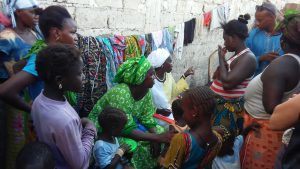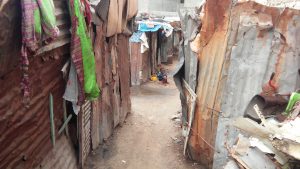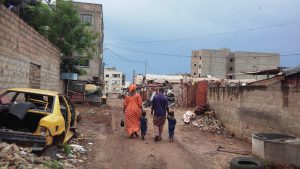 “Your clinic has discovered the measles outbreak and thanks to you we can prevent it getting out of hand!” It’s no small compliment that I get from Mrs. Mbeye while we are together on the way to a house visit. Mrs. Mbeye is the government responsible for the vaccination program in the northern part of Dakar with over half a million inhabitants. Because I know most of the patients, I join her as she goes to the slums.
“Your clinic has discovered the measles outbreak and thanks to you we can prevent it getting out of hand!” It’s no small compliment that I get from Mrs. Mbeye while we are together on the way to a house visit. Mrs. Mbeye is the government responsible for the vaccination program in the northern part of Dakar with over half a million inhabitants. Because I know most of the patients, I join her as she goes to the slums.
 After I seeing several young children with symptoms of measles in just one week at our pediatric consultation, I rang the alarm bells. Through my contacts in the government we quickly got the laboratory confirmation: a measles epidemic. Senegal has its vaccination program well on track, but unfortunately there are still groups who are outside the system. Measles is an extremely contagious disease with a mortality rate of 10%, an epidemic an thus take the lives of many children. It is extremely important to act quickly and to identify new infected patients by doing home visits.
After I seeing several young children with symptoms of measles in just one week at our pediatric consultation, I rang the alarm bells. Through my contacts in the government we quickly got the laboratory confirmation: a measles epidemic. Senegal has its vaccination program well on track, but unfortunately there are still groups who are outside the system. Measles is an extremely contagious disease with a mortality rate of 10%, an epidemic an thus take the lives of many children. It is extremely important to act quickly and to identify new infected patients by doing home visits.
 We arrive in a neighborhood just around the corner from the clinic. I always thought I knew our district quite well, yet I am amazed how densely populated this part is and how primitive the living conditions are. As it is rainy season, many streets are flooded with water. This slum is almost exclusively populated by immigrant from Guinea. They stay, often with their family, temporarily in Senegal to make money as a fruit or vegetable seller. With this income they return for a few months to their homeland. The poverty is overwhelming and hygiene dramatically. There is no tap water, no electricity and the houses have no toilets.
We arrive in a neighborhood just around the corner from the clinic. I always thought I knew our district quite well, yet I am amazed how densely populated this part is and how primitive the living conditions are. As it is rainy season, many streets are flooded with water. This slum is almost exclusively populated by immigrant from Guinea. They stay, often with their family, temporarily in Senegal to make money as a fruit or vegetable seller. With this income they return for a few months to their homeland. The poverty is overwhelming and hygiene dramatically. There is no tap water, no electricity and the houses have no toilets.
After some searching and asking around we find the house of the twins we treated at the clinic. We enter the shack that’s made of plastic and corrugated iron. The girls are doing a lot better already. Ms. Mbeye takes a questionnaire at the house where several families live together, and she checks all vaccination carnets. She explains the importance of vaccination as she tries to win the trust of this people group. This is not easy sine they are social exclusion due to their background. The fact that we come to their home to see them makes all the difference.
In the following weeks we do a vaccination campaign in this area together with Mrs Mbeye. It soon shows that we were able to win the trust of this immigrant community: a large number of mothers now comes to the clinic with their sick child. Thanks to our cooperation with Mrs Mbeye can now continue to do house visits and provide information in order to get the epidemic under control.